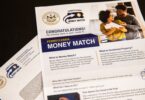Provided by the Pennsylvania Department of Banking and Securities:

The Pennsylvania Department of Banking and Securities (DoBS) is warning investors of an anticipated surge in fraudulent investment schemes.
“As is so often the case during times of emergency, scammers will be looking to profit from the misfortune of others by targeting investors and capitalizing on concerns related to the securities market,” said Acting Secretary Richard Vague. “The narrative of the investment scheme may change, but the underlying scam remains the same.”
The North American Securities Administrators Association (NASAA), of which the department is a member, anticipates fraudulent investment schemes will rise as a result of the ongoing coronavirus outbreak.
In particular, NASAA and the department warn investors to be on the lookout for investments specifically tied to the threat of COVID-19, such as:
- Falsely purporting to raise capital for companies manufacturing surgical masks and gowns; producing ventilators and medical equipment; or manufacturing vaccines or other miracle cures.
- Taking advantage of concerns with securities market volatility to promote “safe” investments with “guaranteed returns” including investments tied to gold and other commodities; oil and gas; and real estate.
- Touting “get rich quick” schemes with quickly earned returns to be used for rent, utilities, and other expenses.
- Targeting retirees and senior citizens, falsely claiming they can quickly and safely recoup any losses to their retirement portfolios.
Retail investors must remain vigilant and protect themselves from schemes such as these tied to COVID-19 and recent economic developments:
- Investigate Before You Invest. Before spending any time and money on a financial service, product, or company, investigate before you invest. Investors can visit the DoBS website for tools and resources for researching financial professionals, investments, and companies.
- Avoid Phishing Scams. Scam emails are made to sound and look real. Never open an attachment or link from an unsolicited email and never share financial or sensitive information without independently verifying the request.
- Too Good to Be True. The old adage is accurate: If it sounds too good to be true, it probably is. Ask questions about the investment and evaluate the risks. Any legitimate investment involves and degree of risk, and anyone unwilling to provide clear and detailed information about an investment is a red flag.
- Beware of Economic Relief Schemes. With news that the federal government will be sending checks to the public as part of an economic stimulus effort, scammers will no doubt increase efforts to steal your money. Do NOT give your personal information to anyone purporting to be from the government in relation to receiving a stimulus check. Likewise, anyone asking you to prepay taxes or fees on the money, or pay any type of charge, in order to receive the money is likely trying to defraud you
For more detailed information related to schemes to watch and tips for protecting yourself, the department has developed a guide for investors.








